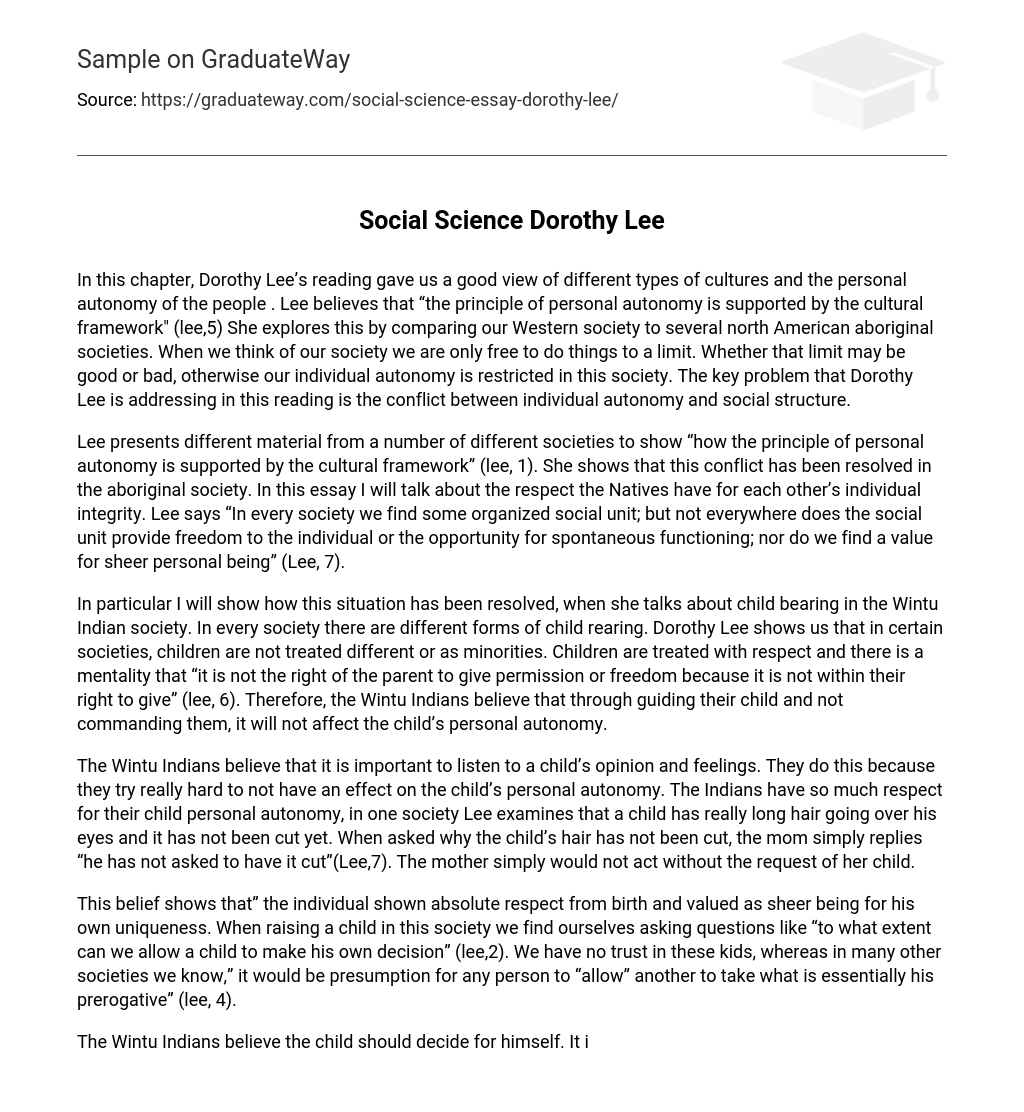Dorothy Lee’s reading provides an insightful perspective on various cultures and the personal autonomy of individuals. According to Lee, the cultural framework supports the principle of personal autonomy. To illustrate this, she draws comparisons between our Western society and several North American aboriginal societies. Unlike these indigenous communities, our society imposes limitations on our freedom, constraining our individual autonomy. Lee’s main focus in this reading is the conflict between individual autonomy and social structure.
Lee (1) demonstrates the support for the principle of personal autonomy within various societies by presenting diverse material. She highlights the resolution of this conflict in Aboriginal society. The focus of this essay is on the respect that Native individuals have for each other’s individual integrity. Lee (7) states that while organized social units exist in all societies, not all provide freedom for individuals or allow for spontaneous functioning, nor do all societies value sheer personal being.
In the text, Dorothy Lee discusses how child bearing is addressed in the Wintu Indian society and how this issue has been resolved. According to Lee, different societies have different approaches to child rearing. She highlights that some societies, like the Wintu Indians, treat children with respect and do not consider them as minorities. The Wintu Indians believe that parents do not have the right to grant permission or freedom to their children, as it is not within their power to do so. Instead, they guide their children without imposing commands, in order to preserve the child’s personal autonomy.
The Wintu Indians prioritize the act of listening to a child’s perspective and emotions, as they highly value the preservation of the child’s personal autonomy. In one observed society by Lee, an Indian child’s hair was remarkably long, reaching his eyes, and had not been trimmed. When questioned about this, the mother replied, “he has not expressed a desire for a haircut” (Lee,7). The mother firmly adheres to the principle of not taking action unless explicitly requested by her child.
This belief demonstrates the idea that individuals are highly respected and valued for their own distinctiveness from the moment of their birth. When bringing up a child in this society, we often question how much independence we can grant them in making their own choices (lee,2). We lack trust in these children, while other societies recognize that it would be presumptuous for anyone to grant someone else the right to exercise what rightfully belongs to them (lee, 4).
The Wintu Indians believe in allowing the child to make their own decisions, as it is not the parent’s role to grant permission or freedom (Lee, 7). They do not follow a strict timetable for their children; instead, they feed them when hungry and put them to sleep when tired, respecting their individual needs. From birth, the Wintu place great value on the uniqueness of each individual and show absolute respect. They also teach children from a young age to be empathetic towards others and express emotions when they face problems.
When a child is taught at a young age about these things, it will become natural to them as they grow older. Chinese culture provides an example of this training, as American observers noted that there was no effort to toilet train these infants. Surprisingly, these babies were able to communicate to their mothers that they needed to urinate at just 6 months old. The mother herself learns to sense the baby’s signs when they need to urinate, and through this awareness “sensitizes herself to the rhythm and helps the baby develop social discipline naturally” (Lee, 8).
The baby becomes toilet trained at an early age and maintains their autonomy because their mother patiently listens to them. Society greatly influences us, even impacting how we communicate with our children and potentially affecting their personal autonomy. The Wintu Indians’ children seek information by using the phrase “can I,” indicating to elders that they are asking about the rules of structure (Lee, 6).
Another example would be when a child is seeking information on the rules of a structure like religion. The child would ask, “is it permissible for me to” or “do you allow me to” (lee, 6). This illustrates that the elders give the child freedom and also display their respect for the child’s individuality (lee, 6). In conclusion, Dorothy Lee highlights how certain societies possess a profound respect for the integrity of each individual, from child rearing to language.
She wants us to consider the importance of personal autonomy. The purpose of her paper is to illustrate the differences between diverse cultures and societies, which are often regarded inferior in Western society. Lee also demonstrates that these “other” societies effectively retain their personal autonomy. They possess a profound respect for each other’s individual being and personal autonomy. This level of personal autonomy, as exhibited by the Wintu Indians and other societies, would be challenging for Western society to adopt due to our cultural values.





